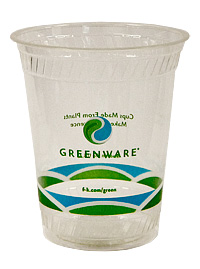The Problem with Plastics
Up to 10% of total U.S. oil consumption is used for the production of conventional plastics. And as oil prices continue to rise, so does the cost of plastic materials, virtually all of which are petroleum-based. These costs are passed on to both consumers and businesses.
Looking to the near future, our widespread use of petroleum-based plastic products and our dependence on fossil fuels is economically unsustainable.
Petroleum-based plastics are toxic to the environment and toxic to us

These products may remain for centuries in our surrounding environment, but they also live on in our bodies. Chemical and petroleum derived plastics often contain allegedly harmful chemicals like Bisphenol A (BPA) and phthalates — linked to hormone disruption and developmental disorders.
When such plastic products are washed, heated or stressed, the chemicals can leach into the foods and liquids we put into our bodies. And they have. In 2009, the CDC found BPA in the urine of 93% of surveyed Americans over the age of six.
Petroleum-based plastics don’t really biodegrade
What does “degradable” really mean? This and other associated terms used by the plastics industry can be misleading. For instance, while conventional plastic grocery bags are often considered “degradable or “oxy-degradable”, they are actually “photo-degradable”. That means exposure to sunlight breaks them down into smaller and smaller pieces, eventually becoming microscopic pieces of” plastic!
These tiny plastic particles slowly make their way into our watersheds, through creeks and storm drains to the open sea to perpetuate vast areas of ocean plastic pollution that kill sea animals and contaminate the food chain.
Disposed plastic products that remain onshore clog landfills or litter the roadside, and do not break down in our or our childrens’ lifetime.
The Solution
| Product | Brand Name | Sample Products |
| Cellophane: Plastic made from wood. Composed from cellulose, a tree and plant component, cellophane is one of the first plastics ever made.
It can be obtained through sustainable growing practices or as byproducts of wood harvest. |
BioMass Packaging® carries cellophane products made from NatureFlex a 100% cellulose bioplastic with excellent oxygen, grease, oil and moisture barrier characteristics. NatureFlex bags are certified to be both home compostable and commercial compostable.
NatureFlex™ by Futamura (Japan) is a major source of renewable cellophane film. |
Cellophane is used for packaging film applications like sandwich wrap, food wrap, and transparent food bags.(Most other film products called cellophane actually have a layer of petroleum-based plastic such as PVC.) |
| PLA (Polylactic Acid) is plastic made from vegetable starch. A clear alternative for food packaging, it resembles common petrochemical-based plastic, such as PET (polyethylene terpthalate) and PS (polystyrene). | Most PLA is marketed as Ingeo biopolymer by U.S. company NatureWorks LLC. NatureWorks, LLC ferments the lactose found in non-food grade corn into lactic acid. Which is converted to lactide. The molecules are linked into long chains or polymers becoming polylactic acid, PLA. | Cutlery, clear cold drink cups, coated paper cups, deli and takeout containers, and fresh produce packaging are among widely available PLA packaging products. |
| PSM (Plastarch material) A high heat resistant bioplastic made from plant starch and polypropylene, with natural modifying agents added, for a range of applications. |
PSM is a primarily bio-based thermoplastic resin that, like conventional plastic, is water-and oil-proof. It has a high endurance for cold and heat. | SpudWare non-compostable high heat cutlery. |
| Mater-Bi Composed mainly from plant starch. | Italy-based Novamont is a manufacturer of a Genetically Modified Organism (GMO)-free, starch-based plastic called Mater-Bi used to make BioBag branded certified compostable bags. BioBag® is the world’s largest brand of certified compostable bags and films made from Mater-Bi. | Products include shopping bags, waste bags, and food service items such as plates and cutlery. |
